Physical Address
304 North Cardinal St.
Dorchester Center, MA 02124
Physical Address
304 North Cardinal St.
Dorchester Center, MA 02124

Discover how these game-changing camp cooking secrets will revolutionize your outdoor meals and eliminate campsite kitchen stress forever.
You’ve probably experienced the frustration of campsite cooking gone wrong – burnt meals, forgotten essentials, or the chaos of unorganized meal prep. Whether you’re a weekend warrior or planning an extended wilderness adventure, mastering outdoor cooking doesn’t have to be complicated. These nine field-tested tips will transform your camp kitchen experience from stressful to seamless, ensuring you’ll spend less time struggling with meals and more time enjoying the great outdoors.
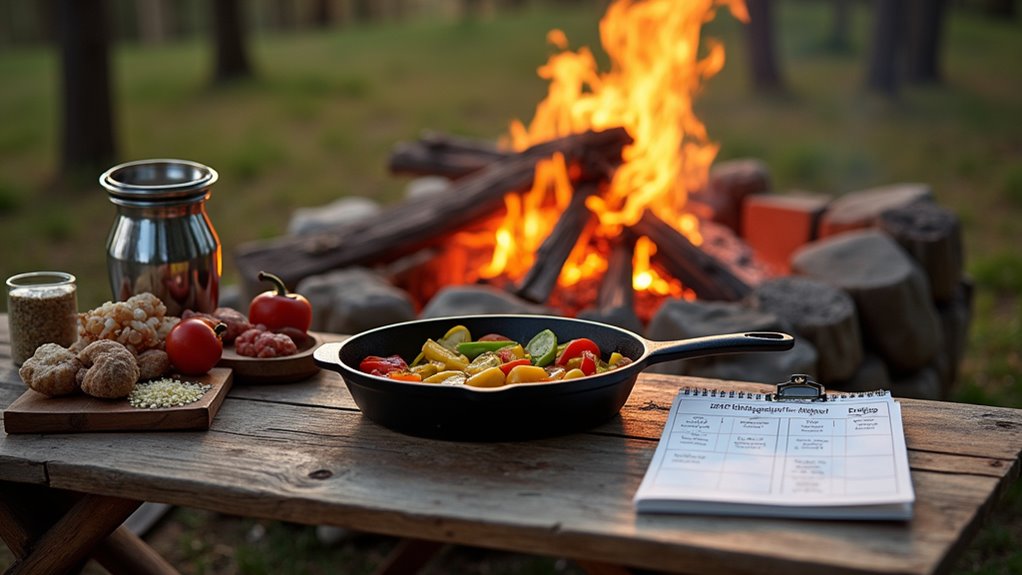
Five key steps can transform your camping meal planning from chaotic to professional-grade. Start by researching your destination’s rules and restrictions – you’ll need to know about fire bans, cooking regulations, and water availability.
Next, craft a menu that balances simplicity with satisfaction, focusing on one-pot meals and including at least one no-cook option. Quick and easy favorites like mac and cheese and quesadillas make great camping staples. Essential camping cookware is also crucial for your outdoor adventures.
Create detailed shopping lists and prep what you can at home, like chopping vegetables or cooking rice.
Smart storage is essential: pack ingredients in labeled, leak-proof containers and organize them by meal.
Don’t forget to check the weather forecast and plan alternative cooking methods for rain. You’ll also want to locate the nearest supply stores for emergency restocking – it’s always better to be prepared than caught off guard.
With your meal plan set, you’ll need the right tools to bring your camping cuisine to life. Start with the basics: a reliable camping stove, fuel, and fire starters.
A well-equipped camp kitchen starts with the essentials: your stove, fuel, and reliable fire starters set the foundation.
Pack a medium pot for boiling water and a frying pan for versatile cooking options.
Don’t forget essential utensils like a sharp knife, cutting board, spatula, and tongs. You’ll need plates, cups, and reusable eating utensils for each camper.
Keep your food fresh in a sturdy cooler and store water in a large jug. For safety and convenience, include pot holders, grill gloves, and a lantern for evening meal prep. Remember to pack dish soap and sponges for cleanup duties.
Consider practical additions like aluminum foil for cooking and storage, a can opener, and a washable tablecloth to create a clean cooking space. Mastering the art of camp cooking can enhance your outdoor dining experience.
These tools will guarantee you’re ready for any outdoor cooking adventure.
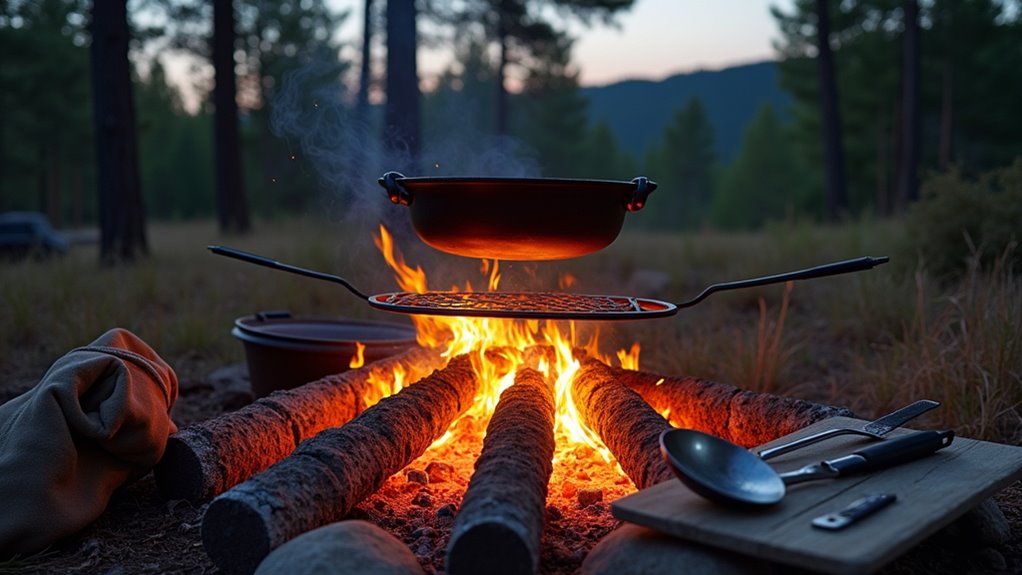
Proper fire management can make or break your camping experience. Before building your fire, check local regulations and assess fire danger conditions. Choose a safe location, preferably in an existing fire ring, and clear a 10-foot diameter around your site.
Start your fire with tinder and kindling, gradually adding larger logs while keeping the size manageable – no taller than 3 feet and no wider than 4 feet. You should keep water and tools nearby for safety. For safe ignition, use matches only rather than flammable liquids.
Essential tips for a safe and enjoyable camping experience can help ensure your trip is both memorable and secure.
Don’t burn on windy days, and never leave your fire unattended.
When you’re done cooking, extinguish the fire completely. Drown it with water, stir the ashes, and repeat until everything’s cool to the touch.
Don’t bury coals, as they can smolder and reignite later. Always pack out unburned trash and follow campsite-specific rules.
Safe food storage stands at the core of a successful camping trip, as proper techniques protect both your provisions and local wildlife.
Proper food storage while camping isn’t just about keeping your meals fresh – it’s about respecting and protecting the wilderness around you.
You’ll need to invest in bear-proof containers and sturdy plastic bins to keep your food secure and organized. Store your food in hard-sided containers overnight, or in your vehicle if bear boxes aren’t available. Hang food supplies 10 to 15 feet above ground when camping in bear country. Properly cooling perishable foods is essential to prevent foodborne illness.
Use stackable containers and collapsible items to maximize space in your camp kitchen, and keep frequently used utensils in a central location for easy access. Don’t forget to seal opened packages with clips or rubber bands to maintain freshness.
Remember to clean your containers regularly to minimize food odors, and always dispose of trash properly.
Check local regulations about required storage containers before your trip, as some areas have specific requirements for wildlife protection.
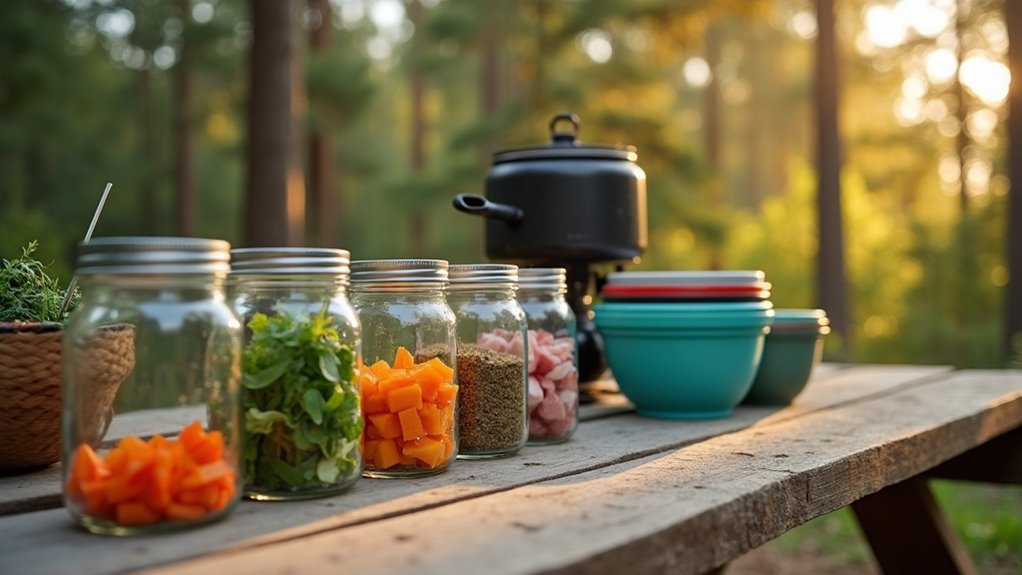
Successful camping meals depend on smart preparation techniques that maximize your time outdoors. You should aim to handle most of your prep work at home, where you’ve got a proper kitchen and comfortable workspace.
Start by pre-chopping vegetables, pre-cooking meats, and parboiling starches like potatoes to greatly reduce your campsite cooking time. Consider storing pancake batter in condiment bottles for mess-free breakfast preparation.
Measure and mix your ingredients in advance, including spice blends and marinades. Pack these pre-measured items in airtight containers, and organize them by meal.
When planning your menu, select recipes that share common ingredients to minimize waste and packing space. Don’t forget to include some quick, shelf-stable meal options for those times when unexpected delays occur or you’re too tired for elaborate cooking. Delicious camping recipes can help inspire your menu planning.
This preparation will transform your camping cooking experience from stressful to seamless.
When camping in the great outdoors, one-pot meals offer an unbeatable combination of convenience and flavor. You’ll find endless possibilities, from hearty Sausage & Tortellini Soup to West African-inspired Sweet Potato Peanut Stew.
Start with quick-cooking bases like orzo or shell pasta, then layer in your proteins – whether it’s chicken, beef, or plant-based options. Easy cleanup is a major benefit since everything cooks in one vessel. Add vegetables like spinach and asparagus for nutrition, and finish with broths or creamy sauces.
Popular recipes include Marry Me Chicken with sun-dried tomatoes and Campers Hamburger Helper. Delicious Dutch Oven Recipes for Your Next Camping Trip can also be a great source of inspiration for your one-pot meals.
To maximize efficiency, pre-chop ingredients at home and add them in order of cooking time. Keep extra liquid handy to control consistency, and remember to stir regularly.
Save delicate ingredients like cheese and fresh herbs for last to preserve their texture and flavor.
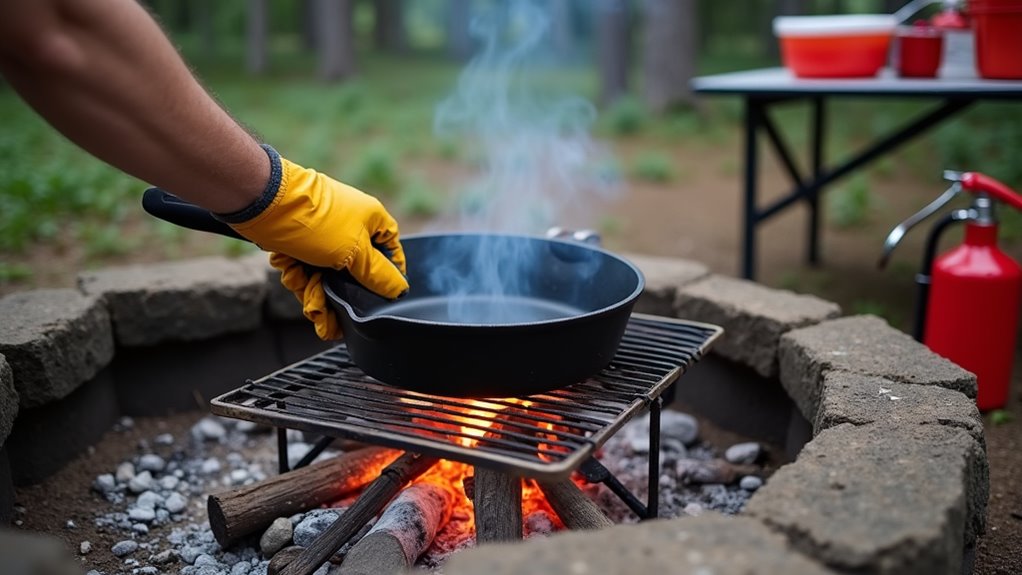
A memorable camping feast begins with proper safety protocols that protect both you and your fellow outdoor enthusiasts. Before lighting that first match, make sure you’re in a designated cooking area and check local fire restrictions. Having water or extinguishers nearby is crucial for fire emergencies.
Keep your cooking station organized with separate cutting surfaces for raw meats and other ingredients.
Essential safety measures for your camp kitchen include:
Packing a comprehensive first aid kit is also essential for your camping adventure.
Don’t forget to pack enough fuel for your entire trip, plus backup supplies.
When you’re done cooking, extinguish fires completely and dispose of food waste properly to avoid attracting wildlife.
Proper cleanup and waste management make the difference between being a responsible camper and an environmental liability. Clear signage at designated disposal areas helps guide proper waste separation. You’ll need to separate recyclables from general waste and dispose of all trash in designated bins. Keep cleaning tools like dish soap and scrubbers readily available for immediate use after meals.
Taking responsibility for your campsite’s cleanliness isn’t just good manners – it’s essential for protecting nature for future generations.
Set up a system for managing organic waste through composting, and if you’re in an RV, always use designated dump stations properly. Essential dish-cleaning tips can help ensure your campsite is left spotless.
Use eco-friendly cleaning products to minimize your environmental impact, and guarantee your campfire is completely extinguished before departing.
When cooking, opt for reusable utensils and containers instead of single-use items.
Remember to check your campsite thoroughly before leaving, guaranteeing you’ve collected all waste and left no trace of your cooking activities.
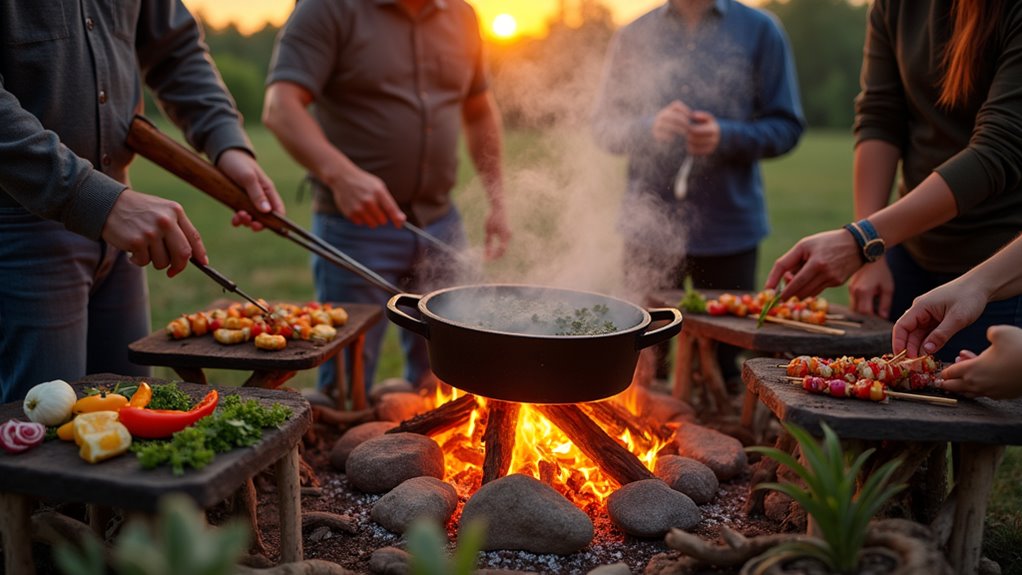
Successful group cooking while camping depends heavily on clear organization and effective teamwork. When you’re coordinating meals for multiple people, it’s crucial to establish clear roles and implement a buddy system for shared cooking responsibilities.
Before your trip, develop an extensive meal plan that accounts for everyone’s dietary needs and preferences. With 11 million new households taking up camping since 2019, group cooking skills are more important than ever. Simple tips for effortless camping cooking can help streamline the process. Consider these key elements for smooth group cooking:
For larger groups, you’ll want to establish a more structured approach with centralized cooking stations, while smaller groups can maintain flexibility with their meal arrangements.
Remember to stay adaptable as conditions and preferences may change during your trip.
Perfectly planned preparation prevents problematic pitfalls when you’re cooking in the great outdoors. You’ll transform from a camping novice to a wilderness chef by following these tried-and-true techniques. From smart storage solutions to mastering meal management, you’re now equipped with essential expertise to elevate your outdoor cooking game. Remember, successful camp cooking isn’t just about the food—it’s about creating memorable moments around the campfire.